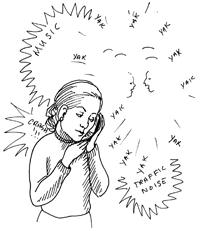STRANGE BUT TRUE- Cut it out: Cover your ear to hear better

DRAWING BY DEBORAH DERR McCLINTOCK
Q. What's the trick to cutting out background noise while on your cell phone in a loud and crowded place? No, sticking a finger in your other ear won't do it. –C. Stuart
A. Surprisingly, the way to hear better is to cover the mouthpiece. Though you'll hear just as much noise around you, you'll be able to hear the caller better, say Sandra Aamodt and Sam Wang in Welcome to Your Brain. The human brain, it turns out, is a marvel at picking out the voice you want to hear from a host of others– the "cocktail party effect." But the phone (cell or not) makes this harder by feeding sounds from the room you're in through the circuitry and mixing them with the signal coming from the other phone.
So now you have the voice plus distorted room noise coming into one ear plus the room noise coming into the other. This is worse than hearing at a cocktail party because both the caller's transmitted voice and the room noise are tinny and mixed together. Covering the mouthpiece can stop the mixing muddle and recreate the live cocktail party situation. Try it. It works!
Q. "What in the thunder was that?" she marvels, not remembering ever hearing thunder in a snowstorm before. –P. Michaels
A. Thundersnow, though rare, can happen with sufficient instability and electrical buildup in the storm, bringing on flashes of lightning, says Randy Cerveny in Freaks of the Storm. Often this will portend as much as 10 inches of the white stuff, report University of Missouri atmospheric scientists, who analyzed 30 years of data from the U.S. Midwest. Wind and hail are often part of the mix.
Another weather oddity is St. Elmo's fire, a small static electricity discharge that can occur with storms, Cerveny adds. A 19th-century British surgeon once commented that during a snowshower his horse's ears became luminous and the brim of his hat appeared on fire. Minute sparks darted toward the horse's ears and "the margin of my hat looked beautiful, and I was sorry to be so soon deprived of it."
More recently, Arizona meteorologists observed an odd electrical discharge during a rare snowstorm in Tucson. From atop an 80-foot tower, they could see short flashes of light originating at or near the ground all across the city. "These were less flickering and intense than normal bolts," Cerveny writes. "There was neither thunder nor radio static. One of the meteorologists speculated that the unusually large wet snowflakes were able to pull electric charges down from the clouds in the fashion raindrops usually do."
Q. Ticklish question #1: Why is it virtually impossible to tickle yourself? And #2: Is tickling ever a torture? –Elmo
A. For you to become "ticklee," there needs to be a "tickler," a "safe" person and not a stranger, say Tom Stafford and Matt Webb in Mind Hacks: Tips & Tools for Using Your Brain. The problem with your self-tickling is that your brain makes an "efference copy" of any motor command, like a carbon copy, so you know it's your movement.
That's a "no go" for tickling. So here's the trick: You set up a robotic system where the robot responds and tickles you in one of your ticklish zones. But you'll need to build in a time delay that fools your brain into thinking the tickle was externally generated! "This just might do it," say the authors.
Yet while the pleasure of tickling is well known, the act can generate pain as well, with the ticklee simultaneously laughing hysterically and writhing in agony. "Indeed, in Roman times continuous tickling of the feet was used as a method of torture."
Q. In a nutshell, why are love and lovers so fickle? –Desdemona
A. You can take this all the way back to the child in us, says Elaine Hatfields in A New Look at Love. Psychoanalyst John Bowlby describes how a 2-year-old checks that Mom is nearby before he sallies forth, having lost interest in her. But should she disappear for a moment, it's a different story: panic and agitation. Of course, once she returns, he's off again.
Sound familiar? When we meet someone who can buffer us from life's frustrations and tribulations, we are relieved, and glow in love. But once we become really secure, we stop focusing on what we have–security– and start longing for what we don't have– excitement.
"Obviously, the child remains in all of us," Hatfields says. "Often it's when we're most secure in our loving relationships that we find our minds wandering to castles– and lovers– in Spain."
Send Strange questions to brothers Bill and Rich at [email protected].
#